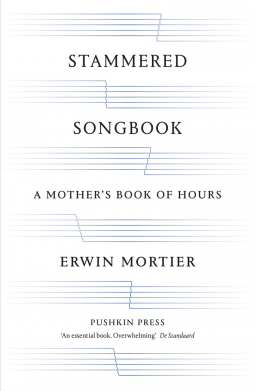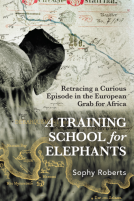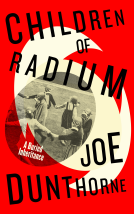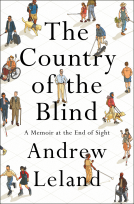
Stammered Songbook
A Mother's Book of Hours
by Erwin Mortier
This title was previously available on NetGalley and is now archived.
Send NetGalley books directly to your Kindle or Kindle app
1
To read on a Kindle or Kindle app, please add kindle@netgalley.com as an approved email address to receive files in your Amazon account. Click here for step-by-step instructions.
2
Also find your Kindle email address within your Amazon account, and enter it here.
Pub Date Jan 05 2016 | Archive Date Oct 26 2015
Description
One day, the author's mother no longer remembers the word for 'book'. This seemingly innocuous moment of distraction is the first sign of the slow disintegration of her mind.
As Alzheimer's disease sets in and language increasingly escapes her, her son attempts to gather the fragments of what she has become, writing a moving, loving chronicle of the gradual descent into dementia of someone who 'no longer knows who she is, where she is or what will happen'.
Advance Praise
'In this painfully beautiful novel it is ultimately love that persists despite everything, the love of a son for his mother. Heart-rending' - de Telegraaf
'Erwin Mortier captures his mother's dementia in sensitive and elegant prose. The splendid sentences with which he frames her deterioration throw it into unexpectedly stark relief' - Trouw
'A wonderful source of sustenance to survive the shipwreck' - Libération
'Erwin Mortier has surpassed himself. This is more than just an immensely touching confessional memoir about Alzheimer's disease. It is an essential book. Overwhelming. Mortier unearths at least one diamond on every page' - De Standaard
'Superb, staggering and even more... At once a clinical observation, a cry of love, a farewell and a meditation. A work of considerable significance' - Humanite
Available Editions
| EDITION | Other Format |
| ISBN | 9781782270218 |
| PRICE | $14.95 (USD) |
Featured Reviews
 Educator 211653
Educator 211653
Thank you Net Galley. This was a deeply emotional read for me. The author has described with great love and deep sorrow the slow passing of his mother. The closeness of the family and their love for each other is the key to this beautiful, tragic story. It certainly helps that the translator has done a first class job. A must read.
 Reviewer 202434
Reviewer 202434
I’ve been reading more non-fiction and more translated fiction this year but not very much translated non-fiction. After reading Flemish author Erwin’ Mortier’s ‘While the Gods Were Sleeping‘ earlier this year which was shortlisted for the Independent Foreign Fiction Prize, I got hold of a copy of ‘Stammered Songbook: A Mother’s Book of Hours’ which is Mortier’s personal memoir documenting his mother’s diagnosis, decline and death from Alzheimer’s disease at the age of 65. Originally published in 2011, it has recently been translated from Dutch into English for the first time by Paul Vincent and has been longlisted for the Green Carnation Prize this week which celebrates LGBT writing.
At just 176 pages in length, ‘Stammered Songbook’ is a concise and affecting memoir with Mortier detailing his caring responsibilities which he shared with his father and siblings as his mother’s symptoms got progressively worse. Mortier pieces together fragments of his mother’s memories from her past as well as his own childhood memories as a way of trying to make sense of what is happening to her. Memory is a central theme in both books and I think those who enjoy Mortier’s fiction should also read ‘Stammered Songbook’. There are some poetic elements to his prose in ‘Stammered Songbook’ but I found Mortier’s writing (and Vincent’s translation) in ‘While the Gods Were Sleeping’ to be much more dense in comparison.
While the subject matter certainly isn’t an easy one to deal with, ‘Stammered Songbook’ isn’t as harrowing as it could have been. It doesn’t feel at all overdone in any way, partly due to its well-judged brevity. Much like Emma Healey’s fictional work Elizabeth is Missing which showed the impact of dementia with compassion and even some occasional glimpses of humour, ‘Stammered Songbook’ is not a wholly morbid account. Nevertheless, it is clear that it is his mother’s declining ability to communicate followed by her emotional rather than physical absence which makes dementia such a devastating disease.
 Eric A, Reviewer
Eric A, Reviewer
Last year I read Emma Healey's moving novel “Elizabeth is Missing” which is daringly written from the perspective of a woman with dementia. She captured the inner life of someone lost to herself. It's a tremendous challenge to write meaningfully about the indignities that dementia entails and make sense of the senseless. When a rational, lively person loses the facility to interact with the world accompanied by all their memories and sense of self in tow they are left only with the functions of the body and fleeting reactions to stimuli. Erwin Mortier's memoir “Stammered Songbook” is a highly personal account of the loss of his mother to dementia, but more than that it's a poetic examination of family, what loving relationships mean and the human condition. In a series of highly compressed short sections, Mortier conveys the daily experience of caring for his mother and sifting through memories of his past.
Mortier describes working with his father and other family members to care for his mother as her symptoms get progressively worse. Much of the time there is a sense of being suspended in an amorphous state: “We live in and outside of time.” Mortier’s mother is there in body, but the essence of what made her a mother, wife and friend has left with all her memories and sense of self. There are the daily tasks of care for her wellbeing which require more and more from the family. Eventually they become incapable of the fulfilling the necessary actions required to properly feed her and prevent her from hurting herself. When it becomes necessary to restrain her, the author hauntingly questions “When does care become another word for torture?” There is a solemn sense of inevitability and acknowledgement that her condition can only get worse. Yet, Mortier travels through this territory with courage savouring the remaining time he has with his mother and reflecting tenderly on family life. He powerfully describes the way that those who have left us still remain in our thoughts: “The dead have a busy time no longer being there.” There are many moments of sorrow in this account of his mother’s disease, but also some blissful light-hearted moments of relief. Passages effortlessly move from blunt facts about the reality of living with someone with dementia to memories to ruminations about life – all infused with a poetic sense that allows the specifics of his experiences to extend into a more universal, beautifully-unifying meaning.
One of the passages I found most powerful in the book was this long meditation on the meaning of love and the way in which we connect to one another: “love is attention. That they are two words for the same thing. That it isn't necessary to try to clear up every typo and obscure passage that we come across when we read the other person attentively – that a human being is difficult poetry, which you must be able to listen to without always demanding clarification, and that the best thing that can happen to us is the absolution that a loved one grants us for the unjustifiable fact that we exist and drag along with us a self that has been marked and shaped by so many others.” This so elegantly summarizes the way in which love is a form of caring without judgement. I find it a very inspirational perspective to have when considering what it really means to love someone throughout the long hard line of a lifetime no matter how much they change or become lost to us.
“Stammered Songbook” is a profound, utterly-unique book.
 Nadia A, Reviewer
Nadia A, Reviewer
Beautiful book that delves into a life with Alzheimer's. Talk about a heart-wrenching read.
 Mandy J, Reviewer
Mandy J, Reviewer
Erwin Mortier’s moving memoir of his mother’s decline from Alzheimer’s disease is a lyrical and heart-rending account of seeing someone you love gradually disappear in front of you. It’s an unflinching portrait but a very tender one, with an acute eye for the detail of everyday life, full of insight into how the disease affects the sufferer and all those who have to care for him or her. A compelling and unforgettable short book.
 Deborah C, Reviewer
Deborah C, Reviewer
I loved this sad but beautiful book written by Erwin Mortier to chronicle his mother's decline from Alzheimer's and its effect on his father and himself. Mortier is a Flemish poet, and Stammered Songbook is a prose poem more than a memoir. The publisher, in its description, provides a hint of the gorgeous language, the unexpected yet perfect metaphors, wielded by Mortier as he tries to make sense of the loss and grief which are the unavoidable by-products of this cruel disease, but I want to offer a few of my own favorite passages:
"This is the mouth I gazed at for heaven knows how long in the cradle. This is the mouth whose gymnastics of caressing, whisper and lullaby must have pulled me upright on the slippery surface of words. This is the mouth that is now shedding its language, stripping the words vowel by vowel into puffs of breath, gnashing of the teeth, smacking of the lips."
"It is as if reverse birth pangs are passing through your cells and each wave is taking something else of you with it."
". . . what probably matters most as long as we're breathing: that love is attention. That they are two words for the same thing. That it isn't necessary to try to clear up every typo and obscure passage that we come across when we read the other person attentively - that a human being is difficult poetry, which you must be able to listen to without always demanding clarification[.]"
"She is now a glacial valley - an ice field has scraped over her, and the earth has been scoured away by the masses of ice. In the bare stone, wide furrows are legible. Every relief has been smoothed flat."
Mortier reveals the perversity at the core of Alzheimer's disease - that it steals the mind while leaving the body intact, even healthy - before desperately asking, "When does care become another word for torture?"
Stammered Songbook is short - I read its 176 pages in a single sitting, surrounded by soggy Kleenex - but its emotional depth surpasses that of books three times its size. Everyone, whether concerned with Alzheimer's disease, loss, grief, love, family, language, the soul, or what it means to be human and alive, will find a melody to savor and reflect upon in Stammered Songbook.
I received a free copy of Stammered Songbook from the publisher in exchange for an honest review.
In fragmentary vignettes, some as short as a few lines, Belgian author Mortier chronicles his mother’s Alzheimer’s, which he describes as a “twilight zone between life and death.” His father tries to take care of her at home for as long as possible, but it’s painful for the family to see her walking back and forth between rooms, with no idea of what she’s looking for, and occasionally bursting into tears for no reason. Most distressing for Mortier is her loss of language. As if to compensate, he captures her past and present in elaborate metaphors: “Language has packed its bags and jumped over the railing of the capsizing ship, but there is also another silence … I can no longer hear the music of her soul”. He wishes he could know whether she feels hers is still a life worth living. There are many beautifully meditative passages, some of them laid out almost like poetry, but not much in the way of traditional narrative; it’s a book for reading piecemeal, when you have the fortitude. (3.5 stars)


















